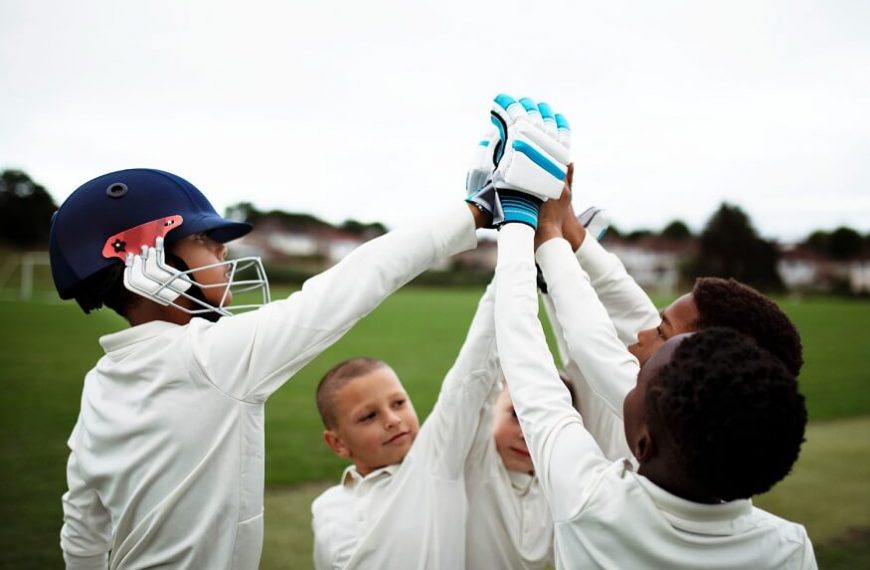Sportsmanship means being courteous to everyone involved in the game — participants, coaches and fans. The sportsperson needs to be clear about the rules of the game and respect whatever decision is taken. The most important thing in sportsmanship for kids is to be able to win and lose with dignity, appreciate the good performance of their opponents and exercise self-control when they lose. Sportsmanship qualities, respect for others and fair play require discipline, consistency and practice which will help to build a cohesive team and self-confidence.
Sports are so exciting that it’s easy to get caught up in a game to an extent where winning seems to be all important. But children also need to be taught from a very young age that there is much more to sports than just winning. Good sportsmanship qualities is a life lesson that you can help your children learn while making sure they have a fun and safe sports experience. Though hard to define, good sportsmanship includes being able to win without gloating, lose with dignity and respecting one’s opponents. Good sportsmanship qualities, understanding the value of teamwork and being fair to others can improve their emotional growth and help them learn values that will stay with them throughout their lives. These are a few qualities you can instil in your kids to inculcate true sportsmanship.
What Does Teaching Sportsmanship Entail
Teamwork is the one of the most important tenets of sports and teaches children how to work with others for the good of the whole team. Fair play and true sportsmanship for children can be inculcated by guiding them in the right direction.
- Kids have to learn to respect one another even in the face of disagreements.
- Asking kids to reflect on their own behaviour and where they could improve is very helpful.
- Teach by example. If kids see adults reacting in a negative way to a loss, they feel such behaviour is acceptable.
- Plan games with teams of differing skill levels so kids learn how to lose and win and lose with humility.
- Teaching kids and organising activities in the classroom about fair play, respect and sportsmanship goes a long way.
- Teach children to work with their peer group to instil a sense of teamwork.
- Encourage children to understand others’ beliefs and point of view.
Tips for Teaching Children Good Sportsmanship
Apart from teaching by example, there are a few other things that children need to learn about good sportsmanship, respect and fair play. Some of this can be taught subtly while sometimes you may need to be a bit more direct in your approach.
- They need to be told that they shouldn’t make excuses for losing and definitely shouldn’t gloat if they win.
- Drill into them that it’s important to always do their best, learn from their mistakes and get back into the game.
- If someone makes a mistake, one shouldn’t get into a blame game and start criticising them and instead remain encouraging.
- Always be respectful to yourself, your team, coaches and officials of the game.
- As a parent, you will always be a role model to your kids so make sure you uphold and display good sportsmanship qualities whether you are playing the game yourself or cheering your child’s team.
- Teach your child that though it might sometimes seem easier to win by cheating, it’s essential to follow the rules. They have to be explained that rules are there for a reason and they need to be followed.
- Stay focused on the game rather than arguing or shouting at your teammates, referees or coaches. Negative words, bad or abusive language is a definite no-no.
- An adult should give even the least skilled players a chance to play and have fun. It’s good to win but it’s even more important to play fair. A child or team should win because they played well and more importantly because they followed the rules. Cheating cannot be accepted and cutting corners is not okay.
- A child needs to be taught to follow directions. They have to listen and obey what their coaches and referees tell them while on the field or are participating in team activities. Referees and other officials have an extremely tough job of making split second decisions on the field and their decisions need to be accepted even if you don’t necessarily agree with them. The focus for the child should be the game and nothing else.
- Respect for the other team in the same way they would like to be respected is something children need to learn. Whatsoever the outcome of the game may be, they need to show respect for the effort put in by the other team. If their opponent wins, they should learn to accept defeat, appreciate their game and move on. If they win, they should be gracious about it and not brag or gloat.
- A team plays best when each team member supports the team and encourages and praises their teammates for what they do best. They should not focus on their mistakes and avoid criticism. Parents are an important role model in this behaviour so they should praise children when they have done well and even if they have not played as well as expected.
- Encourage children to end the game with a handshake. The aim of sports is to enjoy the game and always end it on a positive note, irrespective of whether they lost or won. There is no place for threats or anger on the sports field.
Sports are an integral part of life and the thrill and sense of achievement that comes with it are deeply ingrained in us from childhood. But the traits of fair play, respect and sportsmanship are equally if not more important. Children have to be taught integrity, the true spirit of playing on the field and respect for rules. This inculcates mutual respect, positive values like fair play and essential life skills that hold them in good stead on the field and in life as well. Coaches and parents have to work as partners to create a conducive environment for everyone to enjoy the game. You can also contact EuroKids for further information and tips to help enhance these qualities in your child.

















